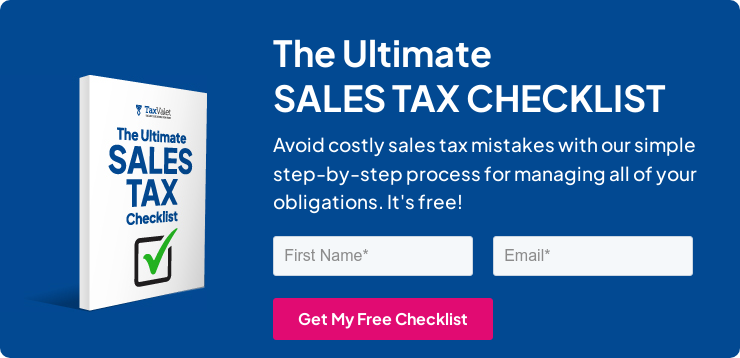Quick Answer: You need to get a sales tax permit in Alabama if you have a physical presence or meet economic nexus requirements. More detailed information on nexus requirements in Alabama is included below.
What is Sales Tax Nexus Anyway?
Your business owes sales tax in any state where it has “sales tax nexus”. In short, if you have sales tax nexus you need to collect and remit sales tax. If you don’t have sales tax nexus, you generally don’t need to get a permit.
Sales tax nexus is a legal term that means you have crossed a threshold and now have a sales tax collection responsibility in the state. Nexus can be created by having a physical presence, an economic presence, or by other factors. Nexus rules vary by state and retailers have specific nexus rules based on where they have people, property or inventory.
What Should You Do Once You Determine You Have Sales Tax Nexus?
Once you determine that you have sales tax nexus in Alabama, your next step is to register for a sales tax permit in the state. Check out our blog post on getting a sales tax permit in Alabama for more information about that process. If you are not interested in doing the work of getting the permit yourself, TaxValet can handle the permit registration for you with our Sales Tax Permit Registration service.
Common Ways to Have Sales Tax Nexus in Alabama
1. Economic nexus in Alabama
If you made $250,000 of sales in Alabama, then you are required to register for, collect, and pay sales tax to the state. If you meet this threshold, it does not matter if you have a physical presence in Alabama. Nexus has been created based on your volume of sales. See Code of Alabama 1975, Section 40-23-31 and 40-23-83 for more information.
If you need help determining which states you have crossed economic nexus thresholds in, check out our Sales Tax Starter Kit service.
2. Physical presence in Alabama
The following creates physical presence nexus in Alabama. If you have any of the following in Alabama you need to get a sales tax permit:
- An office or place of business, such as a retail store.
- A warehouse or inventory stored in the state, this includes inventory stored by Amazon. If you are an Amazon FBA seller, Amazon may store your inventory in Alabama. This creates physical nexus for your business. However, if you ONLY sell on approved marketplaces, you may not need a sales tax permit. See “Do You Need a Sales Tax Permit Alabama if You Only Sell on Marketplaces” below for more information.
- Employees in the state.
- Regular presence of traveling salespeople or other agents.
For more information, please see the Frequently Asked Questions page on the Alabama Dept of Revenue website here.
If you need help determining which states you have a physical presence in, check out our Sales Tax Starter Kit service.

Do You Need a Sales Tax Permit in Alabama If You Only Sell on Marketplaces?
If you are an out-of-state, online retailer who ONLY sells on approved marketplaces (such as Amazon, eBay, etc), Alabama sales tax will be remitted by the marketplace and you do not need to get a sales tax permit in Alabama. If you are an in-state business that only sells on approved marketplaces, Alabama sales tax will be collected and remitted by the marketplace and you do not need to get a sales tax permit. However, you may choose to apply for an exemption certificate so you can purchase inventory tax-free. For more information about this exemption, see AL FAQ #10 here.
If you are an e-commerce seller who is unsure of where you need to get a sales tax permit, check out our Sales Tax Starter Kit service.
Uncommon Ways to Have Sales Tax Nexus in Alabama
1. Affiliate nexus in Alabama
What exactly is affiliate nexus? Affiliate nexus can exist when a business has sufficient contact with a state through a separate business. If your out-of-state business has a relationship with an in-state business, then you may have affiliate nexus.
Please keep in mind that an “affiliated business” does not necessarily mean that it is a marketing “affiliate” in the typical sense of the word. Instead, “affiliate nexus” refers to the relationship between two businesses.
In Alabama, out-of-state-retailers must collect sales tax if an affiliate delivers, installs, assembles, or performs maintenance services for the seller’s purchasers within the state.
As stated in the Alabama News Release, the following criteria will determine if the relationship between the entities of an out-of-state vendor and an in-state business establishes nexus:
- If an out-of-state vendor and an in-state business maintaining one or more locations are related parties;
- If they use an identical or substantially similar name, trade name, trademark, or goodwill, to develop, promote, or maintain sales;
- If they pay for each other’s services in whole or in part contingent upon the volume or value of sales;
- If they share a common business plan or substantially coordinate their business plans;
- If the in-state business provides services to the out-of-state vendor related to developing, promoting or maintaining the in-state market, resulting in benefit to the out-of-state vendor.
The following criteria determine whether the entities of an out-of-state vendor and an in-state business are considered “related parties”:
- If one or both is a corporation, and one entity and any party related to that entity in a manner requiring an attribution of stock from the corporation to the party or from the party to the corporation under the attribution rules of Sec. 318, Internal Revenue Service Code, owns directly, indirectly, beneficially, or constructively, at least 50% of the value of the corporation’s outstanding stock;
- If one or both is a limited liability company, partnership, estate or trust, and any member, partner or beneficiary and the limited liability company, partnership, estate or trust and its members, partners and beneficiaries own directly, indirectly, beneficially, or constructively, in the aggregate, at least 50% of the profits, or capital, or stock, or value of the other entity, or both entities;
- If an individual stockholder and his/her family members (as defined in Section 318 of the Internal Revenue Code) own directly, indirectly, beneficially, or constructively, in the aggregate, at least 50% of the value of both entities’ outstanding stock.
If at any point you are stuck and want a team of experts to handle all of this for you, don’t hesitate to contact us.
Disclaimer: Our attorney wanted you to know that no financial, tax, legal advice or opinion is given through this post. All information provided is general in nature and may not apply to your specific situation and is intended for informational and educational purposes only. Information is provided “as is” and without warranty.
What you should do now
- Get a Free Sales Tax Plan and see how Tax Valet can help solve your sales tax challenges.
- Read more articles in our blog.
- If you know someone who’d enjoy this article, share it with them via Facebook, Twitter, LinkedIn, or email.
